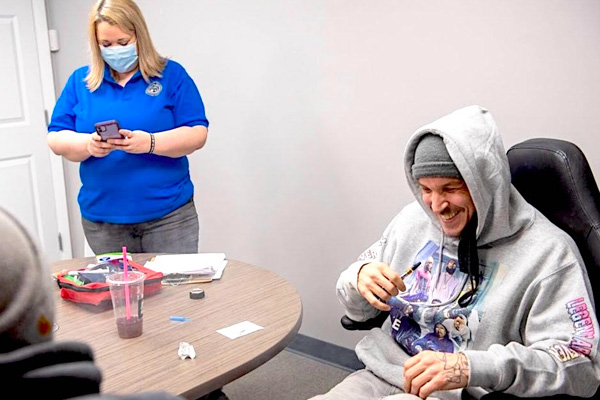GOOD DE‘TOKE’TIVE WORK –
March 19, 2021 – Although adults can buy and consume marijuana legally under Maine law, like alcohol, should they be getting behind the wheel after toking on a joint?
And if they do, can they be busted for driving under the influence? While law enforcement officers in Maine have been equipped for years with the tools necessary to gauge whether a drinking driver is over the legal limit, they appear to lack that same toolbox to detect the level of impairment of pot-smoking or edible-nibbling drivers. On Friday, police officers, sheriff’s deputies and game wardens, largely from Maine, were put to the test at a remote modern building that houses the offices of the nongovernmental, private, for-profit Maine Public Safety Training Institute near the Auburn-Lewiston Municipal Airport. “They’re learning how to detect, investigate and document impairment,” institute Executive Director Andrea Thompson said.
Later in the day, they were tasked with applying their newly acquired skills on the variously buzzed volunteers in an effort to determine their respective levels of impairment. “We’re trying to teach them how to find the clues, what to look for, what the variables are,” Thompson said, “and then, more importantly, documenting it appropriately.” The officers weren’t made aware of which volunteers had consumed which type of cannabis and how much. Nor were they told which volunteer had abstained because he was the designated driver for two University of New Hampshire students. Volunteers ranged from occasional users to veteran stoners, Thompson said. After each officer had conducted field tests, the group later met for a roundtable discussion about the different elements that each of the volunteers had performed, such as the “walk and turn,” the “touch the finger to the nose, and the “stand on one foot.” The officers assessed their volunteers’ respective performances and gauged their levels of impairment. Only afterward were they informed about the level of dosing of the volunteers, Thompson said. “Some people are very, very, very obvious,” she said. “The regular users aren’t so much.” All volunteers are vetted to rule out anyone with a criminal background or dependency issues and — these days — anyone who might have COVID-19, Thompson said. So, while law enforcement officers are able to back up their field tests with breath tests and blood draws to determine whether a motorist’s blood/alcohol content is over the legal limit of 0.08 %, no such lab result is available yet for testing a cannabis-impaired driver.\. Because THC can remain in the bloodstream for long periods, Thompson said, “There’s no way right now for us to know, did they consume today, or did they consume two weeks ago.”



